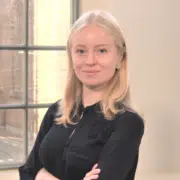De EU verscherpt het toezicht na de Roemeense verkiezingen: TikTok dient interne documenten en informatie te bewaren over hoe het omgaat met de risico’s van manipulaties en aanbevelingen voor gebruikers. Ook moet het platform de komende vier maanden alle gegevens bewaren van verkiezingen, daaronder vallen ook de Duitse verkiezingen in februari.
Volgens Laura Jasper, strategisch analist bij The Hague Centre for Strategic Studies (HCSS) wordt TikTok eruit gepikt omdat daar kiezers rechtstreeks kunnen benaderd worden, gretig gebruikmakend van het specifieke algoritme van TikTok. De app heeft maar liefst 8 miljoen gebruikers in Roemenië, wat significant is in een land waar maar rond de 30 procent van inwoners traditionele nieuwsoutlets vertrouwt. En ook omdat dat platform is nog altijd in Chinese handen is. „Maar de mainstream platformen zoals YouTube, Facebook en X speelden ook een rol.”
Volgens Jasper keren gebruikers terug naar mainstream platforms omdat onder andere Telegram imagoschade heeft opgelopen. „Veel ouders laten daar nu hun kinderen niet meer op. Maar wel op TikTok, wat nota bene bekend werd als een app voor kinderdansjes.”
Deze platforms hebben een breder publiek en een veiliger imago, maar hebben net zo goed een gebrekkige regulering en zwakke factchecken. „Daardoor worden ze nog belangrijker in desinformatiecampagnes”, zegt ze. Dat hun hoofdkantoren buiten Europa liggen, bemoeilijkt bovendien EU-regulering.
Oorlog in de huiskamer
„We moeten waakzaam zijn voor buitenlandse inmenging”, zegt Jasper. Bij dit soort campagnes wordt ingezet op breuklijnen in de maatschappij die al bestaan. „In Duitsland is dat het thema van energiezekerheid en klimaatopwarming, in Polen zien we narratieven rond vluchtelingen en immigranten. Maar ook in Nederland wordt er te snel gedacht dat we desinformatie wel kunnen herkennen.”
„Waar veiligheidskwesties vroeger vooral een zaak van de politie en het leger waren, komen ze nu steeds dichterbij. De oorlog wordt bijna uitgevochten op een telefoonscherm in een huiskamer in Amsterdam”, zegt Jasper. „Deze verschuiving maakt de samenleving kwetsbaarder voor desinformatie die inspeelt op angst en onzekerheid.”







